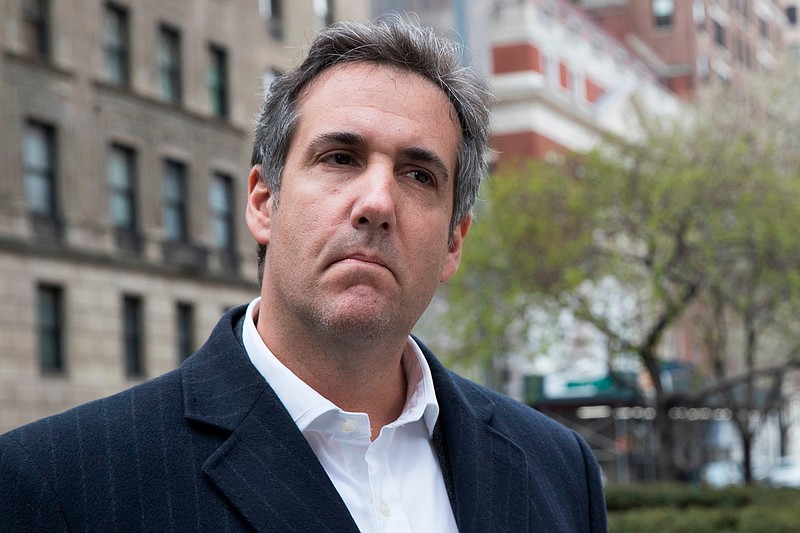"You'll have to ask Michael Cohen. Michael is my attorney. You'll have to ask Michael."
That was President Donald Trump in early April aboard Air Force One when reporters asked about the $130,000 in hush money paid by Cohen to porn star Stormy Daniels just before the election to keep her quiet about an affair she said she had with Trump in 2006.
A few days later, the FBI raided Michael "The Fixer" Cohen's home, office, hotel room and safe-deposit box - seizing business records, emails and documents related to several topics - including the payment to Daniels. The Washington Post reported that Cohen, the longtime attorney for the president, was under investigation for possible bank fraud, wire fraud and campaign finance violations.
But that was just the half of it. The other half is Russia. And it now appears investigators are scrutinizing the intersection of Cohen's work, through a company he formed in the fall of 2016 called Essential Consultants, with the president's interests - other than that of the hush money.
The same bank account that disbursed the hush money received injections of cash from Columbus Nova, a New York-based investment firm whose officials said they paid Cohen $500,000 between January and August 2017 for real estate help. Columbus Nova is an American company that manages assets for a company called Renova, controlled by the Russian oligarch Viktor Vekselberg. Vekselberg attended Trump's inauguration with Andrew Intrater, his cousin, who heads Columbus Nova. A person familiar with their attendance at the inauguration said Cohen, Intrater and Vekselberg were seen together. (Incidentally, Columbus Nova is listed as the registrant behind a handful of domains for websites named after the alt-right that were created during the 2016 election, according to a Washington Post report. It is unclear if any of these websites were launched or ever hosted content.)
Also through Essential Consultants, a Korean defense company competing for a U.S. contract paid Cohen $150,000 to advise it on accounting practices. A global pharmaceutical company, Novartis, said it paid Cohen $1.2 million to provide insight into health care policy - money it continued to pay even after concluding that Cohen had little to offer. AT&T said it paid Cohen $600,000 to better understand the Trump administration. Perhaps to understand how to get its proposed merger with Time Warner approved?
Cohen is not a defense specialist, or a telecommunications expert or a real estate agent. Nor is he a policy wonk on health care or pharmaceuticals. He's not even a registered lobbyist. The only thing he is, is Trump's lawyer and self-described "fixer." Oh, and an associate of Russian mob figures.
It's like Vinnie comes to the swamp, where selling access is common.
But if Cohen promised specific government actions in exchange for payments, he's in trouble. Investigators could be looking at his business as the crossroads of extortion or bribery. Investigators, no doubt, also are looking to see if any of Cohen's consultant facilitating benefits his primary client - Donald Trump or the Trump Organization.
What did the president know about Cohen's access enterprise? When did he know it? And was the Cohen insight-into-Trumpworld consulting shingle just another pass-through for Trump cash?
Those are questions yet to be answered, but the Washington Post posits that if nothing else, the Cohen-Russia connection "reinforces the remarkable sloppiness of those around Trump when it comes [to] avoiding ties to Russians."
The New York Times reports that both the Russian oligarch and his cousin have been interviewed by special counsel Robert Mueller's team. And the Times, in an editorial, reminded readers of Trump's "shadowy money trail" in the decade before the election when Trump did "something unusual for a real estate developer - he all but stopped borrowing money."
That was, no doubt, in part because multiple bankruptcies don't engender favorable loan reviews in American banks.
The Times and the Post have reported that beginning in 2006, the Trump Organization spent $400 million in cash on various projects. The president's son Eric said they did that with cash generated by other Trump businesses, even at the height of the Great Recession. But Eric and his older brother, Donald Trump Jr., have also said they had Russian funding.
"Russians make up a pretty disproportionate cross section of a lot of our assets,' Donald Jr. said in 2008. "We see a lot of money pouring in from Russia."
By 2007, Cohen and the Trump Organization had found each other.
It was Cohen, during the 2016 campaign, who pursued plans for a Trump Tower in Moscow, coordinating with Felix Sater, a felon with ties to Russian mobsters and a longtime Trump adviser. And in a February 2017 White House visit, Cohen left a plan to lift sanctions against Russia for then-National Security Adviser Michael Flynn. The plan was proposed by Sater and a Ukrainian politician with ties to Paul Manafort, Trump's former campaign chairman. Flynn has since pleaded guilty to lying about his contacts with Russians, and Manafort is under indictment on charges of financial crimes involving Russians.
This Russia thing is not a witch hunt. It's a trend, and the trend continues.
